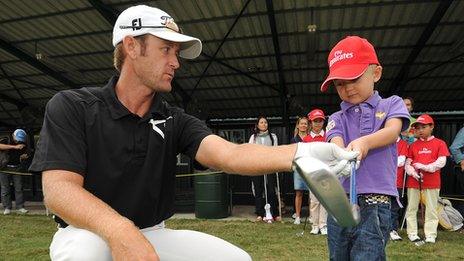Masters 2015: Augusta caddie's 53rd and final appearance
- Published
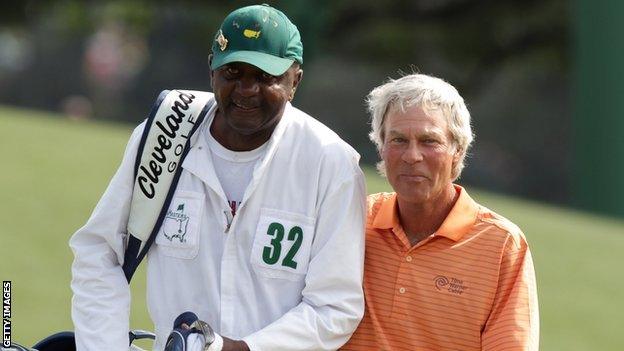
Carl Jackson has caddied for Ben Crenshaw at Augusta since 1976
As a boy, Carl Jackson would swim and fish in Rae's Creek. He would bring along a frying pan, a stove and some grease and cook the bream where he reeled it in, on the banks of Augusta National's 12th green.
This week, Jackson will caddie in his 53rd and final Masters. He was 14 when he caddied in his first, in 1961. Billy Burke, whose bag he was on that week, played in a necktie and plus fours. Burke won the 1931 US Open,, external after a 72-hole play-off. Jackson has pretty much seen them all.
"I will miss the spirit of Augusta," Jackson, 68, tells BBC Sport. "When the time comes to say goodbye, I don't know how I'm going to deal with it."
If he had it his way, Jackson would push on until he broke 70. Never mind that he's already outdone the Eisenhower Tree, which bowed out in 2014., external
But Ben Crenshaw, whose Augusta caddie Jackson has been since 1976 and with whom he has won two Masters, says the course has become too much for him. Crenshaw still feels its spirit; his body is no longer willing.
And so on Friday, the two men who owe each other so much will tackle Amen Corner one last time. Perhaps Jackson will pause on the Hogan Bridge, sniff the air and smell that pan-fried bream. Then they will head down the stretch, stop in at the scorer's hut and hang up the spikes, before driving down Magnolia Lane and into Augusta history.
Carl Jackson in numbers |
|---|
14 - Age at which he first caddied in the Masters, in 1961 |
68 - Age on his final Masters appearance, in 2015 |
53 - Number of Masters appearances in total (inc. 2015) |
39 - Number of times on Ben Crenshaw's bag (inc. 2015) |
1984 - First Masters victory with Ben Crenshaw |
1995 - Second Masters victory with Ben Crenshaw |
It is a chequered history, mainly of poor blacks and privileged whites. Clifford Roberts,, external co-founder of Augusta National, once said: "As long as I'm alive, all the golfers will be white and all the caddies black." Roberts killed himself in 1977, on Augusta's par-three course, two years after Lee Elder became the first black man to play the Masters., external
But at least Augusta National provided poor black kids with a living. If the fabled tract of land hadn't been on Jackson's doorstep, he doesn't know where or how he might have ended up.
"There came a time when I needed to make some money to support the family," says Jackson, who grew up in Augusta's Sandy Hill neighbourhood with a mother who was a maid and eight siblings.
"My first time caddying at Augusta National was May 1960, when I was 13. All seven of my brothers caddied at one time or another. We played a lot of golf. But until I was 18 I couldn't play anywhere in Augusta, not even on the public courses. So I played on playgrounds or fields instead."
In 1961, Jackson started caddying for future club chairman Jack Stephens, who paid well. But President Dwight D Eisenhower, also an Augusta National member, was less enamoured with the arrangement.
"General Eisenhower thought I was too young to be working there, which caused the club some problems," says Jackson. "They considered running me away but Mr Stephens stepped in and saw to it that I got a home education."
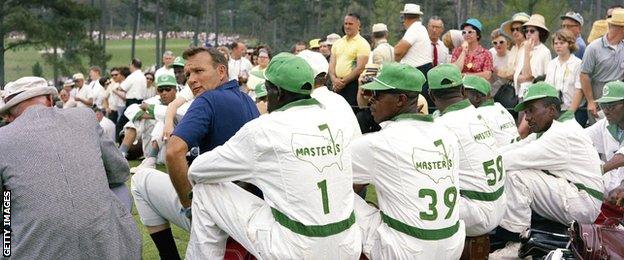
Four-time Masters champion Arnold Palmer sits with Augusta's caddies at the 1965 tournament
That same year, Jackson became part of the Masters rotation. First up was Burke, 44 years his senior, who taught Jackson the fundamentals of caddying in tournament play. In 1964, aged 17, Jackson was paired with Australian Bruce Devlin, who finished fourth behind winner Arnold Palmer., external
Six years later, Jackson found himself on the bag of South African great Gary Player, in somewhat regrettable circumstances. In 1966, Player was quoted as appearing to support the policy of apartheid in his home country, external and his original assignment in 1970, Ernest Nipper, withdrew after receiving death threats.
"I knew I would be taking a risk," says Jackson, "but Gary Player was a world-class golfer, had a chance of winning the Masters and I really needed that kind of money. So I said yes. I caddied the whole tournament with secret service people at my side, sometimes even inside the ropes.
"Mr Player told me on the first hole of the first practice round that all he wanted me to do was keep up and keep his balls and clubs clean. But by the time the tournament came round he was asking for club suggestions. After about the first 27 holes I was also reading greens.
"We did good all the way to the 72nd hole. I suggested he use a five iron for his approach but he said he was pumped up and hit a six iron instead." Player found a bunker and missed out on the Masters' last 18-hole play-off, won by Billy Casper over Gene Littler, by one shot.
Jackson's partnership with Crenshaw was brokered by Stephens, who thought the two shy, quietly spoken Southerners might make a winning combination.
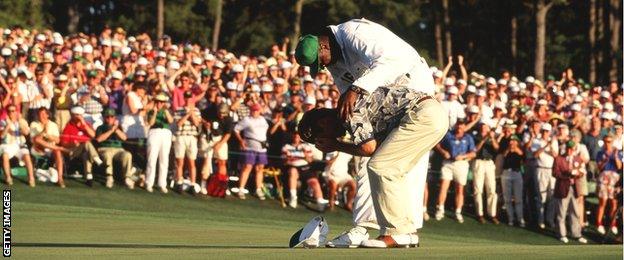
Crenshaw is comforted by Jackson after holing the winning putt at the Masters in 1995
In their first year together, Crenshaw finished second to Ray Floyd, one of 11 top-10 finishes at Augusta over a 20-year stretch. That extended purple patch included victories in 1984 and 1995 - and two of the most famous moments in Masters history.
The first was Crenshaw's monster birdie putt at the 10th in '84, the perfect illustration of the man's peerless touch on the greens. The second was Crenshaw dissolving into Jackson's arms having holed the winning putt in '95, the perfect illustration that they were so much more than golfer and caddie.
"Just before the tournament in 1995, Ben's mentor Harvey Penick died," says Jackson, who has missed one Masters since his debut, when he was recovering from colon cancer in 2000. "And things were not going well with Ben's golf game.
"During the Monday practice round, I took a shortcut onto the ninth fairway and watched him tee off. I thought: 'Ben, you look like you're playing hockey back there.' So I suggested we skip the back nine and go to the range. I made a couple of suggestions and he found something.
"That winning putt in '95 is my best memory of Augusta, no doubt. And that picture of us hugging still has pride of place in my home today."
Reminded of a recent Crenshaw quote, that "everything I've achieved at the Masters I owe to Carl Jackson", Jackson rebounds the compliment. "I owe Ben a life," says Jackson. "If I was able to give something back, I'm glad for that."
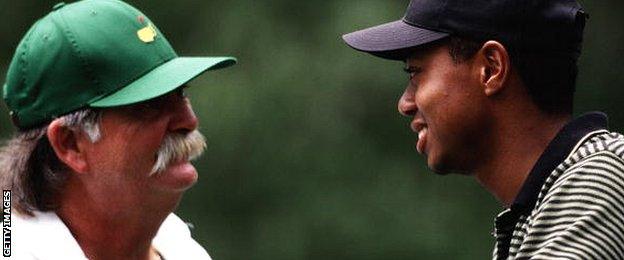
Tiger Woods employed Mike 'Fluff' Cowan as his first pro caddie, winning the Masters with him in 1997
At this year's Masters, there will be fewer black faces out on the course than when Jackson made his debut at the tournament, 54 years ago.
In 1983, Augusta abandoned the stipulation that players must use club caddies. Crenshaw stayed loyal to Jackson, but most players reverted to their regular tour caddies, making Augusta's black 'loopers' surplus to requirements and the Masters whiter than it had ever been.
As recently as 2012, there was only one black caddie on the PGA Tour. What was once seen as a menial job has become a lucrative vocation for university graduates and players' chums, almost all of whom are white and lack the feel and instinct of Augusta's black caddies of yesteryear.
"Even in the early 1970s, a lot of Augusta caddies still wanted to do the club selections from the naked eye," says Jackson, currently the caddie master at the Alotian Golf Club in Arkansas. "Some of the guys, including my mentor Pappy Stokes, just couldn't adjust to using the yardage book."
Tiger Woods, who in 1997 became the first black man to win the Masters,, external fuelled golf's financial boom of recent years more than any other player. It is largely because of him that so many white caddies now earn six-figure salaries.
Carl Jackson, History Man |
|---|
Billy Burke, whom Jackson caddied for in his first Masters in 1961, was born in 1902. Burke won his first tournament in 1927, 20 years before Jackson was born. The youngest player in the 2015 Masters field is 19-year-old Scottish amateur Bradley Neil, who was born in 1996. |
But almost two decades after winning the first of 14 major titles - and more than five decades after the recently deceased Charlie Sifford, external became the first African-American to join the PGA Tour - Woods will be the only African-American teeing up at Augusta this week.
When he became the first official black guest to play a round at Augusta - some time in the 1970s, he doesn't quite remember when - Jackson might have hoped the Masters would look quite different in 2015.
Jackson remembers that when he was standing on Augusta's first tee that momentous day - having been invited to play by an enlightened member - all of his fellow employees were out there watching, "as if Tiger Woods and Jack Nicklaus were about to tee off".
"I was the last to hit," recalls the 6ft 5in Jackson. "I cleared the fairway bunker and there was a big yell, like I'd just won the Masters."
After our chat, a mutual acquaintance questions the accuracy of Jackson's story. "That is uncharacteristic of the club and the decorum in which the employees carry themselves," he tells me.
No matter. The skinny little kid who grew into a willowy old Augusta fixture has earned the right to remember things his way. Those memories are his Green Jackets, and he'll tailor them as he sees fit.
- Published6 April 2015
- Published7 April 2015
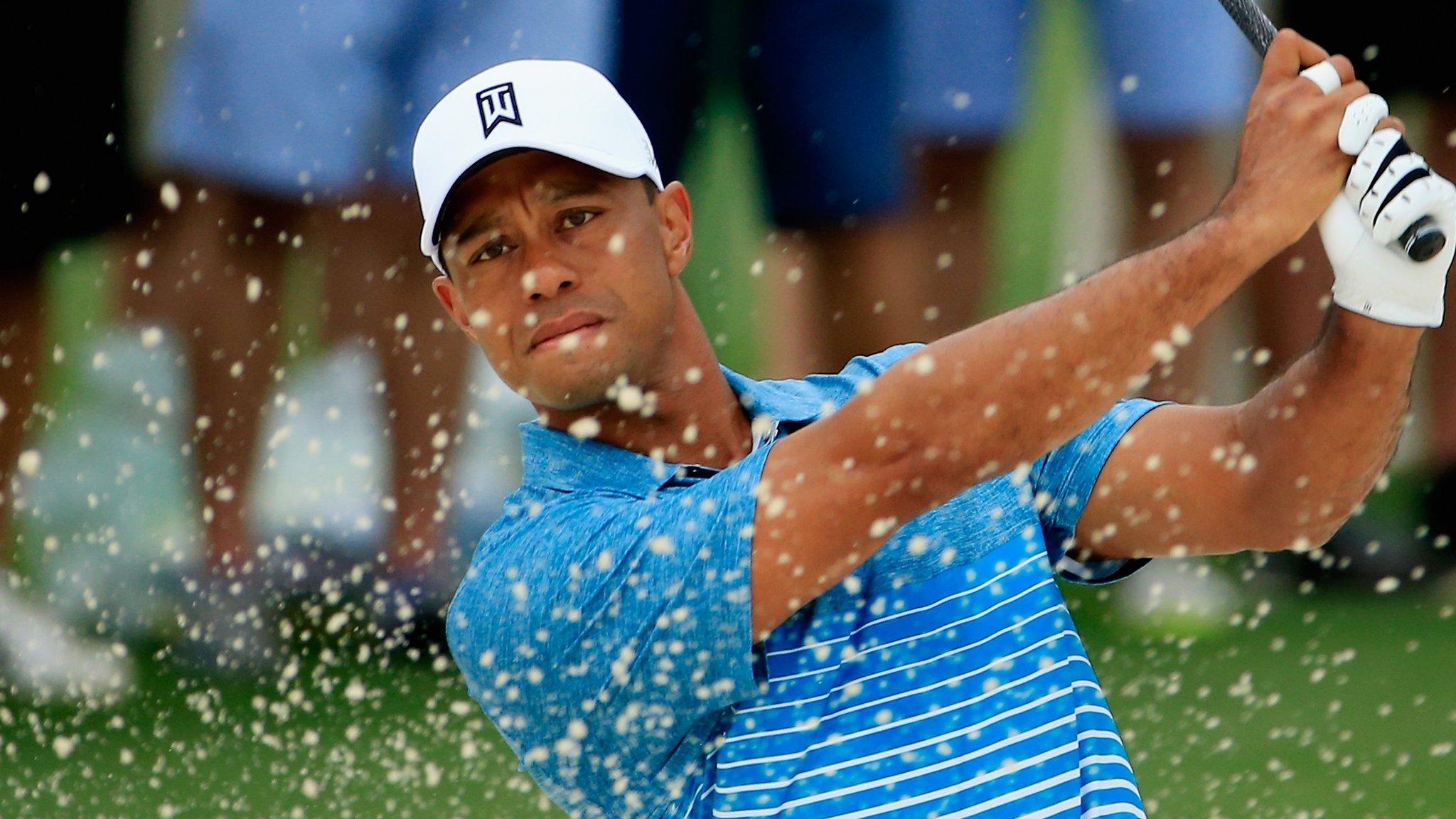
- Published3 April 2015
- Published3 April 2015
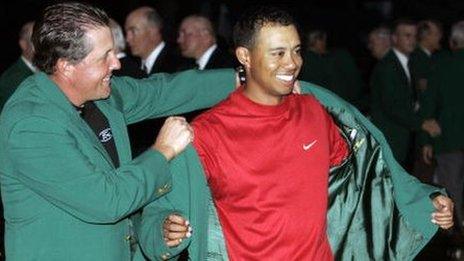
- Published31 March 2015
- Published28 September 2018
